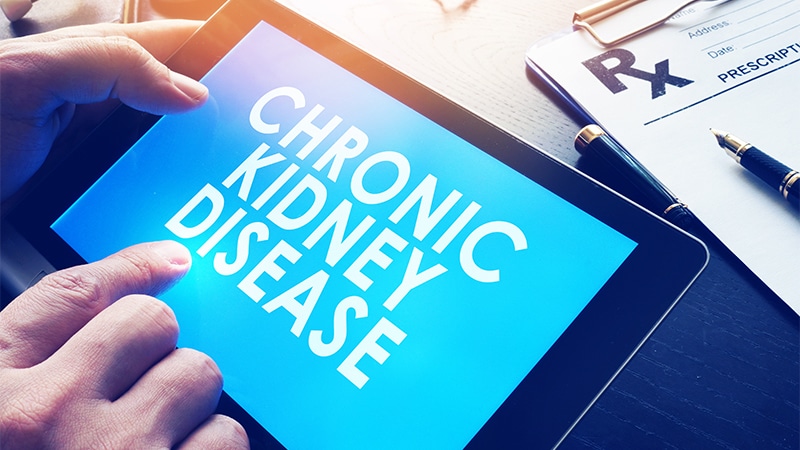
Dr Janani Rangaswami
ORLANDO, Florida — Results from the EMPA-Kidney trial of the SGLT2 inhibitor empagliflozin in people with chronic kidney disease (CKD) with or without diabetes did more than add a second positive result from a large trial in this patient population.
EMPA-Kidney also tripled the overall study experience with agents from the sodium-glucose cotransporter 2 (SGLT2) inhibitor class in people without type 2 diabetes and substantially widened the knowledge of this class in patients who fall across a spectrum of CKD severity and causes.
The primary results from EMPA-Kidney were published online in the New England Journal of Medicine on November 4, and were presented here at Kidney Week 2022, as previously reported. In terms of the trial’s primary efficacy outcome, treatment with empagliflozin (Jardiance) for a median of 2.0 years in patients with CKD significantly reduced a composite outcome of progression of CKD or death from cardiovascular causes by 28% compared with placebo.
“Importantly, EMPA-Kidney broadens the population at risk,” especially people with CKD without diabetes, without proteinuria, and those with an estimated glomerular filtration rate (eGFR) of less than 30 mL/min/1.73m2, commented Janani Rangaswami, MD, professor and nephrologist at George Washington University School of Medicine and Health Sciences in Washington, DC. “This is a win for patients with stage 4 CKD,” she declared, reversing the “nihilism for stage 4” that’s manifested in the past as low representation of these patients in trials of treatment.

Dr Natalie Staplin
“EMPA-Kidney is a very welcome addition to the already strong body of evidence” favoring SGLT2 inhibitor treatment for patients with CKD,” she added.
The Oxford University-based research team that ran EMPA-Kidney immediately plugged the results into a meta-analysis that included 12 additional trials involving an SGLT2 inhibitor in more than 90,000 patients in all 13 trials, including tens of thousands with type 2 diabetes and high cardiovascular disease risk, or with heart failure (with reduced or preserved ejection fraction), or with CKD.
This fresh meta-analysis showed that “SGLT-2 inhibitors safely reduced the risk of kidney disease progression and acute kidney injury [AKI] irrespective of diabetes status,” said Natalie Staplin, PhD, at Kidney Week 2022, organized by the American Society of Nephrology.
CKD Benefit Irrespective of Diabetes Status or Type of CKD
The absolute benefits of SGLT2 inhibitor treatment of patients with CKD exceed the harms, and “the relative benefits do not appear modified by the primary kidney diagnosis” causing the CKD, said Staplin, a senior statistician in the Renal Studies Group at Oxford University, UK.

Dr Naveed Sattar
Two days after Staplin’s presentation of the meta-analysis at Kidney Week 2022, the results appeared in a report published in The Lancet, and were also shared with delegates at the American Heart Association (AHA) Scientific Sessions 2022 in Chicago.
“Before the EMPA-Kidney results, we knew that SGLT2 inhibitors worked well for patients with diabetes and CKD, but we really didn’t know about patients with CKD without diabetes, nor in subtypes of CKD, nor in patients with minimal-to-normal albuminuria,” commented Naveed Sattar, MBChB, PhD, professor of metabolic medicine at the University of Glasgow, UK, and designated discussant for the report at the AHA meeting.
Filling the Data Gaps
The EMPA-Kidney results filled many of these data gaps. A majority, 54%, of the 6609 randomized participants had no history of diabetes, which more than tripled the representation of these patients in SGLT2 trials of patients with CKD from roughly 1400 in the prior CKD trials (primarily DAPA-CKD) to more than 4900.
As far as subgroups based on CKD etiology, EMPA-Kidney included — in addition to patients with diabetic kidney disease — substantial numbers of patients with ischemic and hypertensive CKD, and patients with glomerular disease including IgA nephropathy, although polycystic kidney disease was an exclusion criterion, Sattar noted.
Another important subgroup of patients with CKD included in EMPA-Kidney was those with stage 4 CKD with an eGFR of 20-29 mL/min/1.73m2, who comprised 35% of those enrolled. Also, patients with normal albuminuria levels with urine albumin-to-creatinine ratios (UACR) of less than 30 mg/g constituted 20% of the enrolled cohort, with an additional 28% having a UACR of 30-300 mg/g.
By confirming the efficacy of an SGLT2 inhibitor in this broad representation of patients with CKD regardless of their diabetes status, the EMPA-Kidney results together with the meta-analysis findings established SGLT2 inhibitors as a “foundational” treatment for patients with CKD, just as the class has become foundational for treating virtually all patients with heart failure, Sattar emphasized.
Expect Changing Guidelines
The meta-analysis results are “expected to change chronic kidney disease guidelines,” write Sattar and co-author Patrick B. Mark, MBChB, PhD, in an accompanying editorial.
They also suggest initiating treatment with an SGLT2 inhibitor in patients with CKD either before or in parallel with a renin-angiotensin system inhibitor. And they call on nephrologists to “work with and empower primary healthcare providers to ensure” early and widespread use of SGLT2 inhibitors in patients with CKD.
“The point of the meta-analysis is [for nephrologists] to work with primary care to implement SGLT2 inhibitors and avoid hesitation” in prescribing these agents, Sattar said during his AHA talk.
Building on DAPA-CKD to Improve Uptake of SGLT2 Inhibitors in US
Rangaswami, who was a second discussant for the meta-analysis at the AHA meeting, agreed.
“EMPA-Kidney builds on the signal for kidney protection we already had for SGLT2 inhibitors in the DAPA-CKD and CREDENCE trials [the latter with canagliflozin],” she stressed.
“Hopefully, with it building on the signal from DAPA-CKD” the added data from EMPA-Kidney will boost US uptake of treatment with this class in patients with CKD. Up to now, this uptake has been “unfortunately low,” she noted.
The evidence also suggests that empagliflozin and dapagliflozin (Farxiga), the SGLT2 inhibitor tested in DAPA-CKD, are roughly comparable in terms of benefit for patients with CKD, Rangaswami concluded.
EMPA-Kidney was sponsored by Boehringer Ingelheim and Lilly, which jointly market empagliflozin (Jardiance). Staplin has reported receiving research funding from Boehringer Ingelheim, Lilly, and Novo Nordisk. Sattar has reported being a consultant and speaker for Boehringer Ingelheim and Lilly as well as other companies. Rangaswami has reported no relevant financial relationships.
Kidney Week 2022. Abstract FR-OR69. Presented November 4, 2022.
Mitchel L. Zoler is a reporter for Medscape and MDedge based in the Philadelphia area. @mitchelzoler
For more news, follow Medscape on Facebook, Twitter, Instagram, YouTube, and LinkedIn.
Source: Read Full Article
